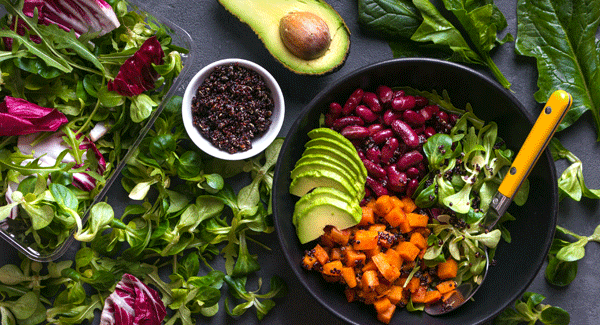Probiotics and Arthritis
Learn how “good bacteria” can help reduce inflammation.
By Jodi Helmer
Ads and articles about probiotics seem to be everywhere. These so-called “good bacteria,” yeast or other living microorganisms in foods or supplements are touted to have health benefits, including for arthritis. Probiotics are found in or added to foods like yogurt, kefir, sauerkraut, tempeh, kimchi and kombucha, and probiotic dietary supplements are available in capsule, powder, tablet and other forms.
Probiotics Basics
Probiotics are thought to promote health by giving a boost to the good bacteria that live in the gut (the so-called gut microbiota). In fact, some of the bacteria that are present in our bodies are also available in probiotic supplements or foods, including certain strains of Lactobacillus and Bifidobacterium.
Everyone has a unique collection of microbes that inhabits their body (in the gut, on the skin and in the mouth, for instance). These communities are altered over time by diet, environment, medications and experiences. Now, scientists are learning that they may also affect many aspects of our functioning.
Probiotics and Your Health
“There is more recognition that gut microbes play a bigger role in our health than we once thought,” explains Katherine Zeratsky, a registered dietician at Mayo Clinic. “All of the beneficial bacteria help keep the bad bacteria in check, and that’s good for your overall health.”
Researchers are discovering that the gut microbiota is crucial to our very survival – for example, by helping our immune system decide if something is friend or foe, and by helping our digestive system extract important nutrients. Some of these microorganisms are good, some bad, others appear to be neutral, and some are both good and bad, depending on the context.
“There is an intimate relationship between [the gut microbiota] and disease,” explains Jeremy P. Burton, PhD, assistant professor at the Canadian Centre for Human Microbiome and Probiotics. “Whenever there is a chronic disease that impacts the intestinal tract, including [autoimmune types of] arthritis, there is the potential to treat it with probiotics.”
Probiotics seem to work in three main ways:
• Maintaining a balance between “good” and “bad” bacteria in your body
• Reducing bad bacteria that cause infections and illnesses
• Replenishing good bacteria that are lost (after illness or a course of antibiotics)
There is also evidence that Lactobacillus and Bifidobacterium, two of the most popular probiotics, might help support the body in a variety of ways, such as:
Probiotics and Your Arthritis
If you have an inflammatory type of arthritis, probiotics may be especially important. The beneficial bacteria appear to have an impact on inflammation, reducing common biomarkers of inflammation, including C-reactive protein (CRP).
“People with inflammatory arthritis also have been shown to have inflammation of the intestinal tract, which results in increased intestinal permeability,” says registered dietitian nutritionist Sonya Angelone, nutrition consultant and spokesperson for the Academy of Nutrition and Dietetics. This enables certain bacteria to cross the intestinal barrier, get into the bloodstream and trigger an inflammatory response. Probiotics may be able to help decrease the inflammation associated with increased intestinal permeability, she says.
“A healthy diet helps keep the intestinal barrier strong and the immune system in a top fighting condition,” Angelone adds. “Healthy foods and probiotic supplements can work together to keep joints healthy and keep the rest of the body strong.”
In a 2014 study published in the journal Nutrition, 46 patients with rheumatoid arthritis (RA) were divided into two groups. One group received daily supplements containing Lactobacilluscasei and the other group received a placebo. After an eight-week period, several markers of inflammation were significantly lower in the probiotic group, leading researchers to state that, although further studies are needed to confirm the results, the use of probiotics may be an effective an adjunct therapy for patients with RA.
Another 2012 study published in the peer-reviewed journal PLOS One, found that gut bacteria in mice could be studied to determine which animals were more susceptible to developing RA and collagen-induced arthritis (CIA) – the mouse equivalent of osteoarthritis. This led researchers to assert that the gut microbiome could be a potential indicator of susceptibility to arthritis.
Selecting Probiotics
Probiotics and their potential effects on certain health conditions are still not well understood. What’s more, Burton warns that supplements are not well regulated, which means there is no guarantee that they contain the same strains of probiotics that have been proven clinically effective. A recent report from ConsumerLab.com found that 30 percent of probiotic supplements did not contain the amounts of helpful organisms touted on their labels.
“There is no real guide for consumers with regards to probiotic supplements,” Burton says. “You should research the strain and dose and compare it to the clinical research to know if it will work – but most consumers won’t take the time to do that, so there is a lot of trial and error.” Look for supplements with a USP label, which indicates that an independent third party has verified the ingredients, and ask your doctor before starting any supplements; they may interact with your medications or produce other unintended effects. Your doctor may also give you guidance on the best way to take them.
Ads and articles about probiotics seem to be everywhere. These so-called “good bacteria,” yeast or other living microorganisms in foods or supplements are touted to have health benefits, including for arthritis. Probiotics are found in or added to foods like yogurt, kefir, sauerkraut, tempeh, kimchi and kombucha, and probiotic dietary supplements are available in capsule, powder, tablet and other forms.
Probiotics Basics
Probiotics are thought to promote health by giving a boost to the good bacteria that live in the gut (the so-called gut microbiota). In fact, some of the bacteria that are present in our bodies are also available in probiotic supplements or foods, including certain strains of Lactobacillus and Bifidobacterium.
Everyone has a unique collection of microbes that inhabits their body (in the gut, on the skin and in the mouth, for instance). These communities are altered over time by diet, environment, medications and experiences. Now, scientists are learning that they may also affect many aspects of our functioning.
Probiotics and Your Health
“There is more recognition that gut microbes play a bigger role in our health than we once thought,” explains Katherine Zeratsky, a registered dietician at Mayo Clinic. “All of the beneficial bacteria help keep the bad bacteria in check, and that’s good for your overall health.”
Researchers are discovering that the gut microbiota is crucial to our very survival – for example, by helping our immune system decide if something is friend or foe, and by helping our digestive system extract important nutrients. Some of these microorganisms are good, some bad, others appear to be neutral, and some are both good and bad, depending on the context.
“There is an intimate relationship between [the gut microbiota] and disease,” explains Jeremy P. Burton, PhD, assistant professor at the Canadian Centre for Human Microbiome and Probiotics. “Whenever there is a chronic disease that impacts the intestinal tract, including [autoimmune types of] arthritis, there is the potential to treat it with probiotics.”
Probiotics seem to work in three main ways:
• Maintaining a balance between “good” and “bad” bacteria in your body
• Reducing bad bacteria that cause infections and illnesses
• Replenishing good bacteria that are lost (after illness or a course of antibiotics)
There is also evidence that Lactobacillus and Bifidobacterium, two of the most popular probiotics, might help support the body in a variety of ways, such as:
- Speeding up treatment of certain intestinal infections
- Helping reduce gas and bloating
- Preventing or reducing the severity of colds and flu
- Improving blood pressure
- Alleviating symptoms of inflammatory bowel diseases, including Crohn’s disease and ulcerative colitis
Probiotics and Your Arthritis
If you have an inflammatory type of arthritis, probiotics may be especially important. The beneficial bacteria appear to have an impact on inflammation, reducing common biomarkers of inflammation, including C-reactive protein (CRP).
“People with inflammatory arthritis also have been shown to have inflammation of the intestinal tract, which results in increased intestinal permeability,” says registered dietitian nutritionist Sonya Angelone, nutrition consultant and spokesperson for the Academy of Nutrition and Dietetics. This enables certain bacteria to cross the intestinal barrier, get into the bloodstream and trigger an inflammatory response. Probiotics may be able to help decrease the inflammation associated with increased intestinal permeability, she says.
“A healthy diet helps keep the intestinal barrier strong and the immune system in a top fighting condition,” Angelone adds. “Healthy foods and probiotic supplements can work together to keep joints healthy and keep the rest of the body strong.”
In a 2014 study published in the journal Nutrition, 46 patients with rheumatoid arthritis (RA) were divided into two groups. One group received daily supplements containing Lactobacilluscasei and the other group received a placebo. After an eight-week period, several markers of inflammation were significantly lower in the probiotic group, leading researchers to state that, although further studies are needed to confirm the results, the use of probiotics may be an effective an adjunct therapy for patients with RA.
Another 2012 study published in the peer-reviewed journal PLOS One, found that gut bacteria in mice could be studied to determine which animals were more susceptible to developing RA and collagen-induced arthritis (CIA) – the mouse equivalent of osteoarthritis. This led researchers to assert that the gut microbiome could be a potential indicator of susceptibility to arthritis.
Selecting Probiotics
Probiotics and their potential effects on certain health conditions are still not well understood. What’s more, Burton warns that supplements are not well regulated, which means there is no guarantee that they contain the same strains of probiotics that have been proven clinically effective. A recent report from ConsumerLab.com found that 30 percent of probiotic supplements did not contain the amounts of helpful organisms touted on their labels.
“There is no real guide for consumers with regards to probiotic supplements,” Burton says. “You should research the strain and dose and compare it to the clinical research to know if it will work – but most consumers won’t take the time to do that, so there is a lot of trial and error.” Look for supplements with a USP label, which indicates that an independent third party has verified the ingredients, and ask your doctor before starting any supplements; they may interact with your medications or produce other unintended effects. Your doctor may also give you guidance on the best way to take them.

Stay in the Know. Live in the Yes.
Get involved with the arthritis community. Tell us a little about yourself and, based on your interests, you’ll receive emails packed with the latest information and resources to live your best life and connect with others.




